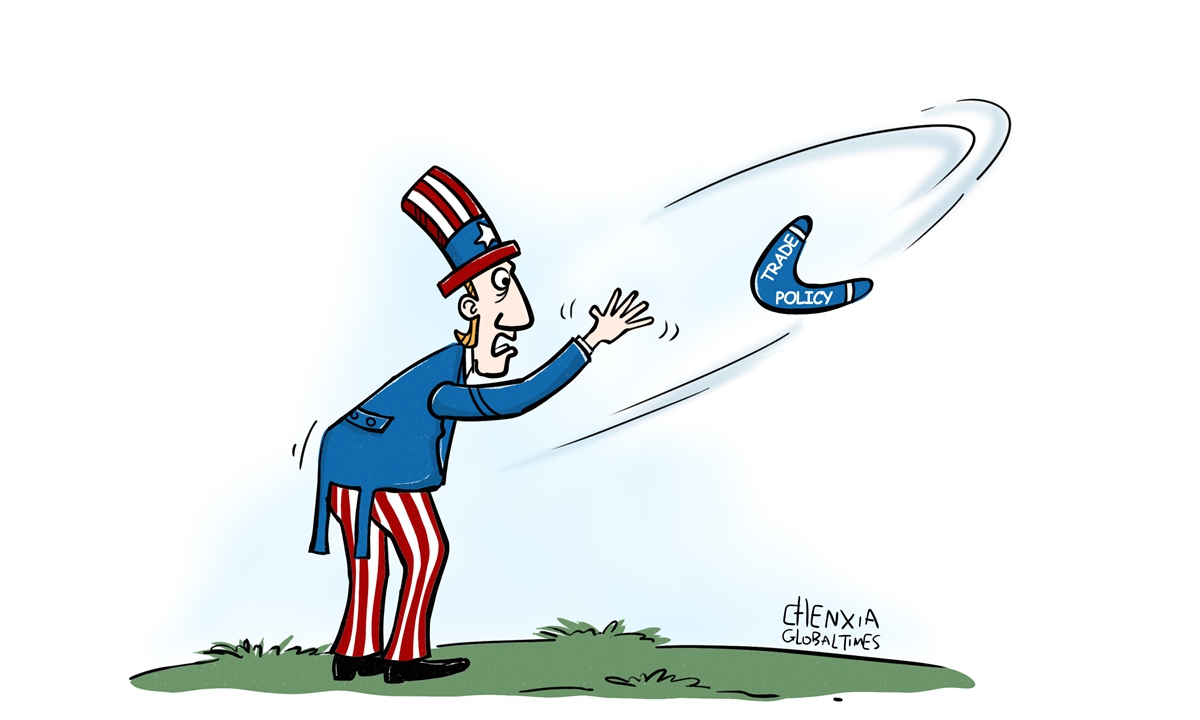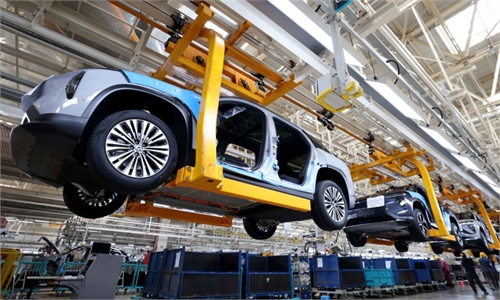
Illustration: Chen Xia/Global Times
When a delegation from the US Treasury met its Chinese counterparts on Monday and Tuesday, Western media outlets again hyped the issue of China's so-called "excess industrial capacity." Currently, some Westerners want to pin the label of overcapacity or dumping on cost-effective Chinese goods. Their misdeeds and short-sightedness will certainly backfire and hurt US firms and consumers.According to the readout of the meeting published on the site of the US Treasury Department, US officials raised issues of concern during the two-day meeting of the China-US Economic Working Group in Beijing, including "China's industrial policy practices and overcapacity, and the resulting impact on US workers and firms."
Some analysts believe it offers a signal that the US may use "anti-dumping" as an excuse to suppress Chinese companies and goods in the future.
In recent years, there has been a growing trend of the US intensifying its suppression and blockades against Chinese companies worldwide, under the guise of "national security." For example, in order to contain Chinese companies like Huawei from gaining a competitive advantage in 5G technology and entering the US and global 5G markets, the US imposed bans on these companies, citing "national security."
However, these arbitrary actions have in turn caused bitter consequences for the US economy. The construction costs of communication networks in the US and its allies have been significantly increased, and progress has been severely delayed. China built more 5G base stations in three months than the US did in two years, the South China Morning Post reported in July 2023, citing government data.
Currently, there is another growing trend among certain politicians in Western countries following the rapid advance of industries like new-energy vehicles (NEVs) in China. This time, the excuse they use to attack China has changed from "national security" to "anti-dumping." By labeling Chinese products as "overcapacity" or "dumping," some Western politicians are seeking to hinder these products from entering the US and global markets.
In an article entitled "China is making too much stuff - and other countries are worried," The Wall Street Journal in November 2023 claimed that "some Chinese factories, saddled with overcapacity in a struggling economy, are trying to export their way out of trouble and stoking new trade tensions." It needs to be pointed out that such rampant hype is typical blame-shifting that confuses right and wrong.
However, the fact is that the affordable and high-quality products exported from China have played a crucial role in alleviating inflationary pressures in Western nations like the US. Instead of "stoking trade tensions," these Chinese exports have actually contributed positively to helping the difficult economic recovery efforts in these countries.
If Chinese-made goods are blocked from entering the US market due to being labeled as products of "overcapacity" or "dumping," American consumers will have to spend more money purchasing products with the same quality as Chinese ones. Especially, unlike previous US crackdowns against China's high-tech rise under the pretext of baseless national security risks, this time consumer goods, in particular NEVs, are likely to become the main target for the US to label China as pursuing "overcapacity" or "dumping," so ordinary consumers will be the first to feel the pain from growing trade tensions with China.
The US is now more than two years into abnormally high inflation - and while the economy appears to have bottomed out and is in the crucial period of stabilization, ordinary people are still very sensitive to price fluctuations. Stubborn inflation has driven some households near the breaking point, and if they are forced to suffer greater economic losses due to Washington's geopolitical game against China, it will result in complaints and dissatisfaction in public opinion toward US trade policy.
Labeling Chinese products as the results of "overcapacity" or "dumping" will be a double-edged sword for both sides. Chinese enterprises, especially NEV companies, may encounter multiple obstacles in developing their international business strategies. The US is home to one of the world's largest, wealthiest and most diverse consumer markets. Chinese companies cannot give up the US market.
The internationalization of Chinese enterprises may not be easy, but it is well worth the effort. The US has been trying to stifle Huawei and curb its global expansion using the guise of "national security" but it failed. If the US launches a new round of attacks and uses "overcapacity" or "dumping" as an excuse to suppress other Chinese companies, its efforts will be futile and doomed to fail, too.



